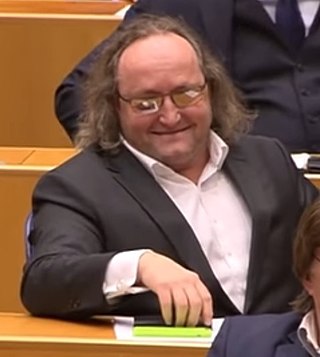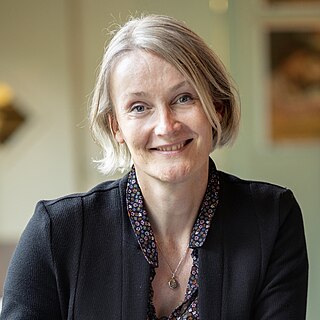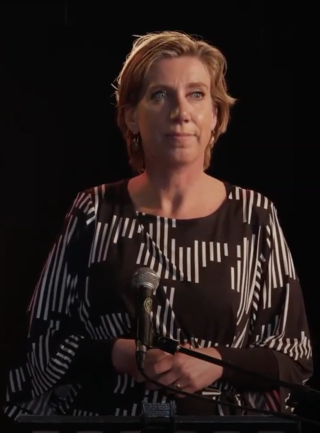
The House of Representatives is the lower house of the bicameral parliament of the Netherlands, the States General, the other one being the Senate. It has 150 seats, which are filled through elections using party-list proportional representation. The house is located in the Binnenhof in The Hague; it has temporarily moved to the former building of the Ministry of Foreign Affairs at Bezuidenhoutseweg 67 in The Hague while the Binnenhof is being renovated.

The Binnenhof and Buitenhof is a complex of buildings in the city centre of The Hague, Netherlands, next to the Hofvijver. It houses the meeting place of both houses of the States General of the Netherlands, as well as the Ministry of General Affairs and the office of the Prime Minister of the Netherlands. Built primarily in the 13th century, the Gothic castle originally functioned as residence of the counts of Holland and became the political centre of the Dutch Republic in 1584. It is counted among the Top 100 Dutch heritage sites. The Binnenhof is among the oldest parliament buildings in the world still in use.

Dion Jean Gilbert Graus is a Dutch politician. He has been an MP on behalf of the Party for Freedom since 30 November 2006.

Khadija Arib is a Moroccan-Dutch politician of the Labour Party, who served as Speaker of the House of Representatives of the Netherlands from 12 December 2015 to 7 April 2021. In the 2016 Speaker of the Dutch House of Representatives election on 13 January, she was elected to the position, which she had served as Acting Speaker since the resignation of Anouchka van Miltenburg on 12 December 2015. Arib became a member of the House of Representatives following the 1998 Dutch general election and served until 2022, with a brief interruption between 2006 and 2007.

Ockje Caroline Tellegen is a Dutch politician. She served as a member of the House of Representatives from September 2012 to March 2022. A member of the People's Party for Freedom and Democracy (VVD), she served as first Deputy Speaker and president of the committee on Education, Culture and Science since 2017.

Remco Paul George Bosma is a Dutch politician. He has been Mayor of Bladel since 16 January 2019. Previously Bosma was a member of the House of Representatives for the People's Party for Freedom and Democracy between 1 March 2016 and 23 March 2017. He served in the States of Flevoland between 15 March 2007 and 1 March 2016.

Hugo Mattheüs de Jonge is a Dutch politician who has served as Acting King's Commissioner of Zeeland since 16 September 2024. A member of the Christian Democratic Appeal (CDA), he was elected to its leadership in 2020 for the 2021 general election. He withdrew later that year, citing an impossibility to combine his position as Health Minister in charge of the COVID-19 pandemic efforts with his party leadership. He later served in the fourth Rutte cabinet as Minister for Housing and Spatial Planning from 2022 until 2024 and Minister of the Interior and Kingdom Relations from 2023 until 2024.

Christianne van der Wal-Zeggelink is a Dutch politician of the People's Party for Freedom and Democracy (VVD).

Wybren Ridley van Haga is a Dutch politician and engineer who was a member of the House of Representatives between 2017 and 2023. He was initially elected as a member of the People's Party for Freedom and Democracy (VVD), but was expelled from the party in 2019, causing the third Rutte cabinet to lose its parliamentary majority. Van Haga subsequently sat as an independent MP before joining Thierry Baudet's Forum for Democracy party, where he was placed second on the party list in the 2021 election. He has since quit Forum for Democracy and created his own political party Belang van Nederland.

J.H. "Henk" de Vree is a Dutch politician, who served on the House of Representatives in the period 2020–21 and from 2023 onwards. There, he represents the right-wing populist Party for Freedom (PVV).

Lisa Mianti van Ginneken is a Dutch politician of the social liberal party Democrats 66 (D66). She worked as a software developer and later gave organizational trainings. She started serving as chair of the organization Transvisie in 2017. She became a member of parliament after the 2021 general election. Van Ginneken is the first transgender person to be elected into the Dutch House of Representatives, where she is her party's spokesperson for IT, privacy, family law, and mobility.

Barbara Catharina Kathmann is a Dutch politician, serving as a member of the House of Representatives since 2021. She is a member of the Labour Party (PvdA). Before being elected to the House, she served as a municipal councilor and alderwoman in her hometown Rotterdam. Kathmann has also worked in media and at two nonprofit organizations.

Ingrid Johanna Maria Michon-Derkzen is a Dutch civil servant and politician of the conservative liberal People's Party for Freedom and Democracy (VVD). She was elected to the House of Representatives in the 2021 general election, and she previously served as a member of the municipal council of The Hague (2014–18).

Daniël "Daan" de Neef is a Dutch speechwriter and former politician. A member of the conservative liberal People's Party for Freedom and Democracy (VVD), De Neef was a political staffer of the VVD and owned a speech consultancy. He held a seat in the Breda municipal council starting in 2018 and was elected to the House of Representatives in the 2021 general election. De Neef stepped down the following year and switched to the Party for the Animals (PvdD) shortly after.

Peter Johannes "Peter" Valstar is a Dutch politician of the conservative liberal People's Party for Freedom and Democracy (VVD). He worked as a press officer for the VVD, as the political assistant of Minister Jeanine Hennis-Plasschaert and Prime Minister Mark Rutte, and as a spokesperson at the Ministry of Defence before being elected to the House of Representatives in March 2021. He lost his bid for re-election in November 2023.

Wieke Paulusma is a Dutch health professional and politician for the social liberal party Democrats 66 (D66), who has been serving as a member of the House of Representatives since the 2021 general election. She started her career as a nurse and also worked as a health care manager. Besides, Paulusma served on the Groningen municipal council between 2014 and 2021.

Chris Simons is a Dutch politician. He serves as a member of the House of Representatives since 22 March 2022. Simons is a member of the People's Party for Freedom and Democracy (VVD).

Henk Staghouwer is a Dutch administrator and Christian Union politician. He served as Minister of Agriculture, Nature and Food Quality in the fourth Rutte cabinet from 10 January to 5 September 2022. From 24 April 2013 to 10 January 2022 he was a member of the provincial executive of Groningen.
The parliamentary inquiry into natural gas extraction Groningen was a parliamentary inquiry by the Dutch House of Representatives between 2021 and 2023 and was investigating the natural gas extraction from the Groningen gas field and the problems that it caused. The goal of the inquiry was to gain insight into decision-making regarding natural gas extraction, earthquakes, damage handling and reinforcement of buildings.






















